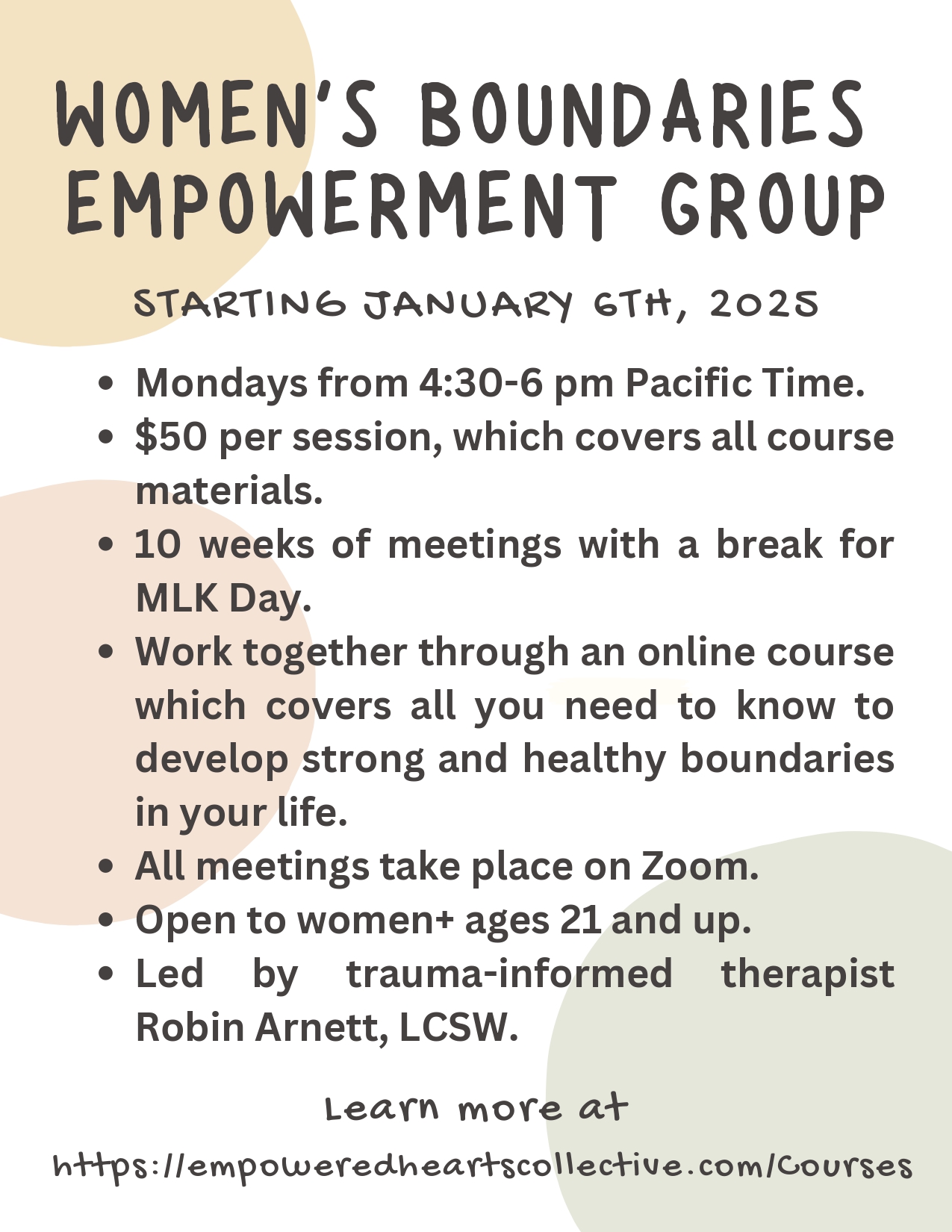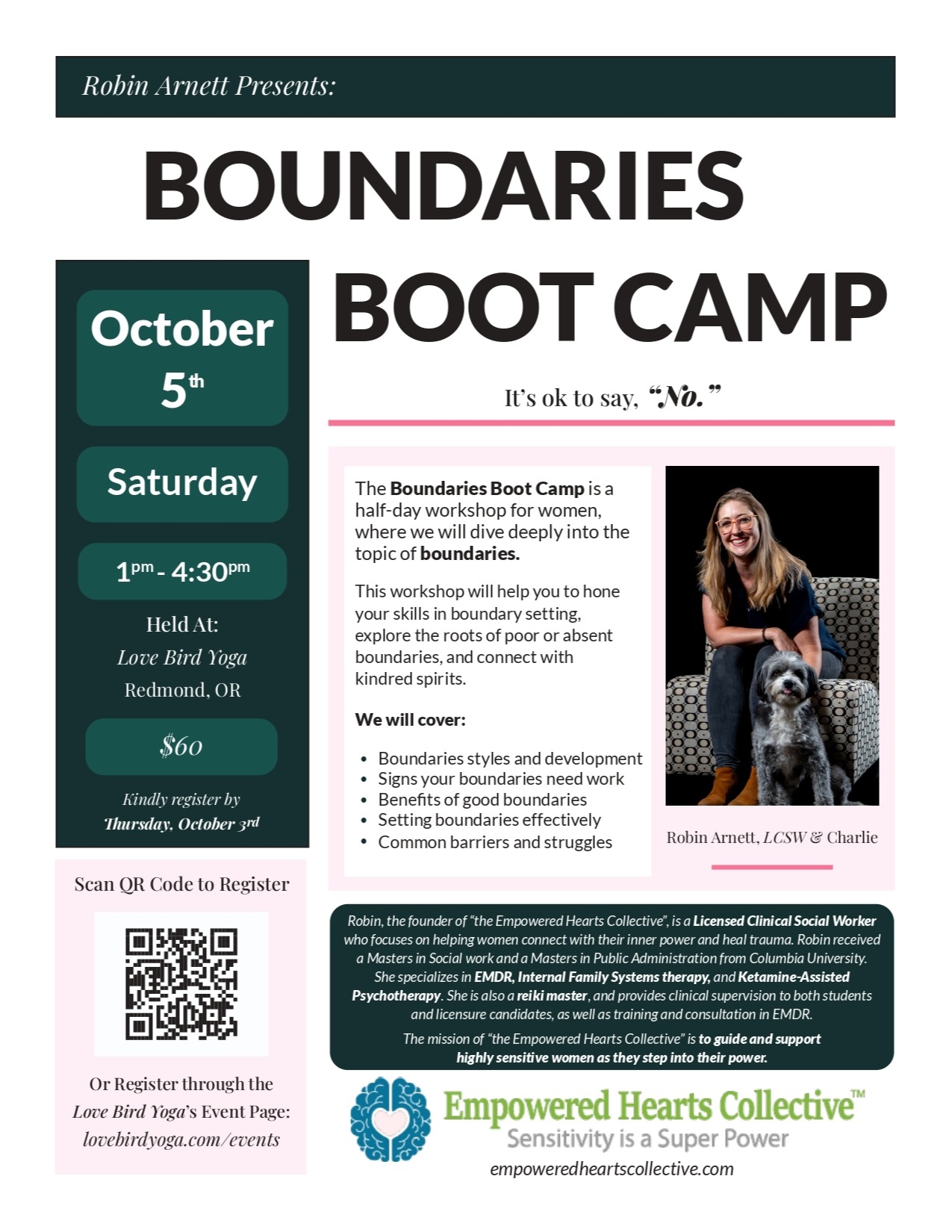Take the first step to stronger boundaries—unlock your free course, Module 7: Setting Effective Boundaries, from the Intuitive Boundaries Mastery Series.
Unlock Free ModuleWhat to Expect When You Start Setting Boundaries
The Good, The Bad, the Annoying, and How to Manage It All
By Robin Arnett
Whenever we’re doing something new, especially something that might scare us, it can be helpful to know what to expect so we can prepare ourselves mentally for what’s to come. Fear can even keep us from doing something that we know could be good for us if we don’t feel prepared to manage what’s next.
In this blog, I’ll outline what to expect from the boundary setting process, and some ways to manage what comes up. Some of this will be happening inside of you, and some of it will be happening in your relationships. Not everything will be pleasant, but that doesn't mean that you're doing it wrong or that it’s not worth doing. The journey is worth it, and I'll talk about some of the good stuff to expect as well.
Expect the Mess
If you expect this process to go completely without conflict or confusion, you will inevitably be hard on yourself when things do get difficult, and I really don’t want that to happen. It’s too common for sensitive people who give a lot to be harsh on themselves, and the point of setting boundaries is to make your life easier and happier.
Give yourself a ton of grace, because you’re going to need it. I promise this will be worth it in the end.
Internal Experience - Guilt and Fear
We experience guilt due to internalized messages and beliefs on what we should and should not do, want, and be, and we tend to feel bad for failing to give others what they want. In doing so, we take on other people’s stuff that isn’t ours.
When you’re feeling guilty about setting boundaries, remember that any relationship dynamic that hurts one of the people in it inevitably harms everyone involved, so when you take care of yourself, you’re putting good into the world.
Unfortunately, some people who are in abusive relationships may fear physical violence, being cut off financially, and emotional and verbal abuse. These are extremely difficult situations that require an added level of care and awareness, and people in these relationships may need extra support and protection.
In many ways, the experience of guilt and fear is something that we simply need to meet with compassion. Facing your fears reduces their power, and remembering that boundaries are healthy can help with guilt. It may help to develop mantras around why you’re doing what you’re doing, and envision the future that you’re hoping to reach through the boundaries you want to set.
Relational Barriers to Boundary Setting
Lack of Understanding or Surprise
What they’re saying when they're surprised by new boundaries is essentially code for, “This is different from what I am used to and it makes me uncomfortable.” You’re not responsible for making that discomfort go away. Just let it ride. You can offer empathy and validation. For example, saying something like “I understand that this is different, and I know change can be difficult.” - but remember that you don’t need to fix it for them. That isn’t and never was your responsibility.
Changes in Relationships and Shifting Roles
For example, if you’ve played the role of caretaker, martyr, or peacemaker, these identities may be challenged when you start to set boundaries and experience shifts. It’s crucial to remember that your worth and who you are is so much bigger and more beautiful than the roles you’ve played. Although it may be scary, letting go of these roles gives you a chance to open up to new possibilities and learn the depths of who you really are.
Boundary Testing, Protests, Tantrums, and Gaslighting
You may be told that you are being unfair, you may see yelling and crying, and you might even get the silent treatment. Much of this can be distilled to the message of “I’m no longer getting what I want, and I don’t like it,” or, “I don’t want to do this thing that you’re asking me to do.” Remember that a tantrum is essentially a person’s last ditch attempt to get their way. In some ways, a tantrum can actually be a sign that a person feels fearful and powerless.
Know that when you witness a tantrum, this is actually a sign that you have a good amount of power in the dynamic. If you can tolerate the discomfort of the interaction and stick to your guns, eventually the tantrums will subside. And much like with toddlers, it’s crucial to stay calm and be consistent.
You may also experiencing "gaslighting," which is another way of saying that you’re made to feel like you’re crazy or that your reality is invalid. You may be told that you’re making up a problem, that you’re being dramatic, or that you have no right to feel the way that you feel. Again, remember to hold firm and stay consistent.
If you find yourself on the receiving end of gaslighting, remember that your experience is legitimate and important. In fact, setting boundaries is a way of stating that validity to yourself and the world.
The Plus Side
Here are some of the positives of setting boundaries:
- Increased feelings of self-respect
- Increased feelings of empowerment
- More energy
- More time
- Increased clarity and understanding of your relationships
- Stronger connections in relationships
Good boundaries are a proclamation of self-worth. You are insisting that your wants, needs, feelings and experiences are inherently important, simply because they are yours, which is the truth! Insisting on your own self-worth not only helps you to live life in a way that honors your own humanity, but it also takes the burden of building your self-worth off of your loved ones.
Creating Safety for Others
One of the biggest pluses of starting to set good boundaries is that you’ll be building your authenticity and integrity. When you are taking care of yourself, you can make choices that are in alignment with your values, your desires, and your energy. You’ll be saying yes to what you want to do, asking for what you need, and saying no to what you don’t want to do. All of this also means creating emotional safety for others in your relationships.
When you take care of yourself, you let the people around you know that they are in relationship with a strong, honest, and whole person. This goes back to my boundaries philosophy that anything that you do to honor and take care of yourself has positive reverberations throughout your relationships, your community, and the world.
Because you are authentic and integrated, the people in your life will be able to expect honesty in your responses and behavior. You will be saying what you mean, and meaning what you say, and you’ll also bring joy and enthusiasm to whatever you take on.
You Can Do This!
Bumps won’t last forever. Keep the positives in mind when the tough stuff comes up, and always give yourself credit for pushing through the difficulties. Your experience matters, and your boundaries are valid.
If you’re ready to strengthen your boundaries but want guidance on where to start, the Intuitive Boundaries Mastery Series is here to help. This course is designed to give you foundational knowledge, practical tools, and expert support to make boundary setting a natural part of your life. With structured lessons, real-world examples, and strategies to navigate the inevitable challenges, you’ll gain the confidence to hold your ground while fostering healthier relationships. I wish you nothing but good things for the work ahead.


